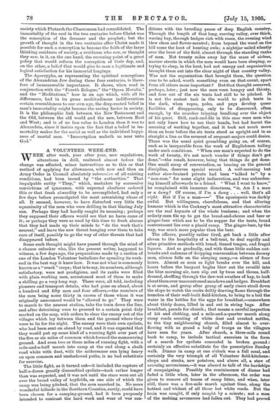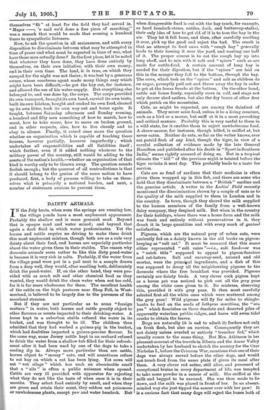Some such thought might have passed through the mind of
a chance onlooker who, like the present writer, happened to witness, a few days ago, the preparations made by a section of one of the London Volunteer battalions for spending its week- end in the best way it knew how. It was not what is commonly known as a "crack " corps ; that is to say, its numbers, although satisfactory, were not prodigious, and its ranks were filled with plain working men, accustomed most of them to make a shilling go a very long way. There were, all told, including pioneers and transport details, who had gone on ahead, about a hundred and fifty men and four officers,—the numbers of the men being some thirty in excess of those whom it was originally announced would be "allowed to go." They were to march to the nearest station, take the train down the line, and after detraining were to proceed to a certain point duly marked on the map, with orders to clear the enemy out of the villages which lay between them and the ground where they were to lie for the night. The enemy were their own cyclists, who had been sent on ahead by road, and it was expected that they would put up some kind of a running fight over part of the five or six miles of common which formed the manceuvring ground. And even two or three miles of running fight, with a mile-and-a-half march into camp at the end along a chalk road white with dust, with the midsummer sun lying heavy on open common and =shadowed paths, is no bad substitute for exercise.
The little fight, as it turned out—it included the capture of half-a-dozen greatly discomfited cyclists—took rather longer than was expected, and it was not until the stars were out all over the broad valley of hayfields, on one side of which the camp was being pitched, that the men marched in. No more wonderful hillside in the Southern Counties, surely, could have been chosen for a camping-ground, had it been purposely intended to contrast the hard work and wear of war con- ditions with the brooding peace of deep English country. Through the length of that long, curving valley, over thick, waving bay, through hedges rich with roses, the evening wind blew clean and flower-scented ; from beyond the wood on the hill came the hoot of hunting owls; a nightjar sailed silently over the brow of the field, almost through the standing ranks of men. Not twenty miles away lay the maze of airless, narrow streets in which the men would have been sleeping. or trying to sleep, in the heat, had not energy and organisation brought them out into the clear night of that country valley. Was not the organisation that brought them, the question rose to be asked, worth something even on that count, apart from all others more important P But that thought occurred, perhaps, later; just now the men were hungry and thirsty, and four out of the six tents had still to be pitched. It is not the easiest task in the world to pitch tents in the dark, when ropes, poles, and pegs develop queer facilities of disappearing, only to be discovered, often enough, by the searcher tripping headlong over the object of his quest. Still, rank-and-file in this case were men who not only knew how to use their bands, but had learnt the meaning of working together, and it took not much more than an hour before the six tents stood as upright and in as straight a line as the severest of sergeant-majors could desire. There was the usual quiet grumbling going on, of course, such as is inseparable from the work of Englishmen toiling under such conditions. "When one man's expected to do the work of twenty, it's not much wonder if things don't get done,"—the result, however, being that things do get done. One small scrap of conversation, as bearing on the general discipline, deserves special record. A well-meaning but rather slow-brained private had been "talked to" by a "non-corn." for some slight indiscretion, and was unburden- ing himself afterwards to a friend. "What I want to know," he complained with immense directness, "is, Am I a man or a dawg P Of course, if I'm a damg . . . well, that's all right. But if I'm a man—" The aposiopesis was darkly awful. But willingness, cheerfulness, and that alluring humour which is the Cockney's most attractive characteristic are the real keynote of the whole business ; and when the orderly-men file up to get the bread-and-cheese and beer or ginger-beer which are to be the supper for the tents, broad contentment lies over a placid camp. The ginger-beer, by the way, was much more popular than the beer.
The officers, possibly rather tired, get back a little after eleven to the hospitality of a bell-tent, to deal rapidly and after primitive methods with bread, tinned tongue, and frugal liquors. And so gradually, and with those little sudden out- breaks and cadenzas of dropping conversation between drowsy men, silence falls on the sleeping camp,—a silence of four hours. Almost as soon as light breaks over the hill, and hours before the buoyant bugles blow out the reveille into the blue morning air, men slip out by twos and threes, half- dressed, shuffling through the dew-wet swathes of hay, to look about them over unaccustomed meadows and hedges. Breakfast is at seven, and group after group of early risers stroll down the slope to watch the cooks deftly drawing flame through the trenches of their well-built field-kitchen, to bring to a boil the water in the kettles for the eggs for breakfast,—somewhere about thirty dozen, lifted in and out in string bags. After breakfast, parade for church ; that means a careful inspection of kit and clothing, and a mile-and-a-quarter march along stony roads scenting of white dust and crushed nettles, to the tiny neighbouring church, filled almost to over- flowing with as grand a body of troops as the villagers have seen for years. After church, a three-mile round back to camp, to include tactical exercises in the form of a search for cyclists concealed in broken ground ; certainly an effective substitute for the prescriptive Sunday walk. Dinner in camp at one o'clock was a full meal, and certainly the very triumph of all Volunteer field-kitchens: chops and steaks, new potatoes, and above all, a stew of arousing savouriness,—it was absurd to talk of the hardships of campaigning. Possibly the reminiscence of dinner had faded a little when, later in the afternoon, the order was given to remove all traces of camp litter, and when, later still, there was a five-mile march against time, along the hottest and whitest of all those hot white roads. But the train was caught, if only caught by a minute ; not a man of the melting sevenscore had fallen out. They had proved
"Major 'e said we'd done a fine piece of marching," was a remark that would be made that evening a hundred times to sympathetic listeners.
Now, to ask the question in all seriousness, and with every disposition to discriminate between what may be. attempted in time of Peace and what must be expected in time of war, what have those men actually done P. In the first place, let it be noted that whatever they have done, they have done entirely by themselves, on their own initiative, with their own money, and in their own time. The land, it is true, on which they camped for the night was not theirs ; it was lent by a generous owner, whose courteous agent made many things easy which might have been difficult,—he got the hay cut, for instance, and allowed the use of his water-supply. But everything else belonged to, and was done by, the corps. The corps provided its own transport, brought its own band, carried its own tents, built its own kitchen, bought and cooked its own food, cleaned up its own litter, took its own way out and home again. It taught, between Saturday afternoon and Sunday evening, a hundred and fifty men something of how to march, how to scout, how to take cover, how to move on broken ground, and in other respects, also, how to live cleanly and to obey in silence. Finally, it raised once more the question whether an organisation which is capable of teaching those lessons, however partially, however imperfectly ; which undertakes all responsibilities and all liabilities itself ; which further, even if it added nothing whatever to the military power of the country, still would be adding to the assets of the nation's health,—whether an organisation of that kind is worthy only to be thrown away. The question sounds foolish enough ; but the queerest of all contradictions is that it should belong to the genius of the same nation to have produced, first, a body of persons willing to take on them- selves what is primarily a national burden, and next, a number of statesmen anxious to prevent them.







































 Previous page
Previous page